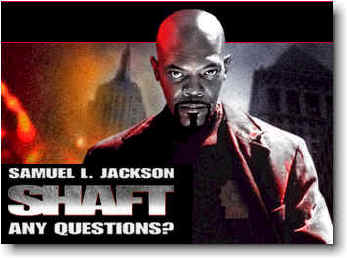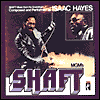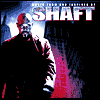Shaft
 Shaft
Shaft
Release in: 2000
Director: John Singleton
Genre: Action, Crime
Toni Collette - Diane Palmieri
Dan Hedaya - Jack Roselli
Samuel L. Jackson - John Shaft
Gordon Parks -
Busta Rhymes - Rasaan
Richard Roundtree - John Shaft
Ruben Santiago-Hudson -
Vanessa L. Williams - Carmen Vasquez
Jeffrey Wright - Peoples Hernandez
Reviewed by Michael Dequina
|
Simply put: "One of the best movie soundtracks in existence". ~Troy Johnson, AALBC.com This was a #1 pop LP and
eventually earned Hayes an Oscar.
Although the soundtrack to John Singleton’s 2000 remake of the classic blaxploitation flick SHAFT won’t overshadow Isaac Hayes’s phenomenal score to the 1971 original (for good measure, the original film’s bad-ass theme is included), it does provide a butt-kicking mix of contemporary soul and hip-hop tracks. Drawing inspiration from the film’s rule-breaking antihero John Shaft, who is played by Samuel L. Jackson in the remake, many of the tracks have a retro feel — particularly R. Kelly’s two cuts, the bluesy "Bad Man" and the gospel-tinged "Up and Outta Here." Other soul highlights include Angie Stone’s Donna Summer- inspired "My Lovin’ Will Give You Something" and Donell Jones’s mellow "Do What I Gotta Do," which cleverly incorporates lyrics from his hit single "Where I Wanna Be" and a bass line from Hayes’s rendition of "The Look of Love." On the hip-hop side, Mystikal speaks out against black-on-black crime on the prophetic "Ain’t Gonna See Tomorrow," while Organized Noize’s Sleepy Brown waxes poetic on the blaxploitation-flavored (with its wah wah guitar and clarinet) "Automatic," and Too $hort slips into his usual mack mode on the funk-drenched "Pimp Sh*t." All of this in honor of one bad mutha. That’s right, we’re just talkin’ bout Shaft. Tony Green
|
Yet nearly 30 years after its original release—and long after the genre it helped spawn, "blaxploitation," died with that decade—the 1971 Shaft remains an extremely entertaining watch, never having completely escaped pop culture consciousness. The reason for this is the same one that explains the film’s connection with moviegoers far beyond the target African-American audience: the title character of John Shaft. While the fact that the strong, smart, virile, and superbly suave Shaft is black is the primary factor for his historical and cultural significance, his broad-based appeal stems from an idea that transcends race: he is comfortable, confident, and proud about who he is, and anyone who had a problem with that could simply kiss his ass.
This fact also explains why John Singleton’s Y2G revival of John Shaft is as enjoyable as it is. Much like the film that started the franchise, this Shaft’s plot doesn’t score points in the originality department, but the energy level and smooth attitude distinguishes it from standard crime thrillers.
Contrary to what has been reported over the past few months, this Shaft is not a remake of the original film, but more of a sequel/spinoff. The star audiences know and love from the original film and its first two sequels (1972’s Shaft’s Big Score! and 1973’s Shaft in Africa), Richard Roundtree, once again plays John Shaft, who still runs a private investigation firm in New York City. However, the focus of the film lies on his same-named nephew (Samuel L. Jackson), who, as the film begins, is a cop whose take-no-crap demeanor constantly leaves him at odds with his superiors. When a privileged young man named Walter Wade Jr. (Christian Bale) accused of a brutal, racially-motivated murder is allowed to be released on bail, a disgusted Shaft leaves the force and decides to take matters into his own hands as a P.I.
But that’s easier said than done, for also standing in the way of Shaft and his way of justice is Peoples Hernandez (Jeffrey Wright), a Dominican gangster who is hired by Walter to rub out waitress Diane Palmieri (Toni Collette), the only eyewitness to his crime. Peoples—or, rather, Wright is also the big obstacle in Jackson’s way toward commanding this film. Peoples is more of an outrageous comic character for most of the running time, and Wright is insanely funny during these stages. However, he isn’t so funny as to make the character come off as goofy and buffoonish, and Peoples’ eventual turn to more serious villainy is seamless and believable (which probably would not have been the case had he been played by original casting choice John Leguizamo, who bowed out before filming). It’s no easy task to steal a film from the Jackson (who is his usual captivating, charismatic self here), but that’s exactly what Wright does—and makes it seem effortless.
Then again, with such a talented ensemble surrounding him, it is not too surprising that Jackson’s impressive star turn doesn’t quite tower over the rest; he is strongly complemented not only by Wright but all his other co-stars. Bale has already proven his ability to play an uppity killer in American Psycho, so it only follows that his performance as a similar, less exaggerated character would be spot-on. Collette lends the film some convincing and welcome dramatic weight as the frightened, conflicted Diane. Busta Rhymes brings some good laughs as Shaft’s sidekick Rasaan. Registering not as strongly—but through no fault of their own—are Vanessa Williams (as tough narcotics cop Carmen Vasquez) and a dismayingly underused Roundtree; they simply are given little to do in the script credited to Richard Price, Singleton, and Shane Salerno. (Jackson also has little to "do" in a sense; some throwaway footage during the opening credits aside, his Shaft doesn’t even have one sex scene.)
That Singleton once again proves his ability with actors is an especially good thing since he’s not really an action director. This is not to say that he does a bad job with the numerous gunfights and the requisite foot and car chases. They move well (as does the film as a whole) and are reasonably exciting; it’s just that there’s nothing terribly inventive about them. These set pieces are functional in the way the script is: they work well enough, but they’re unsurprising and conventional.
But if there’s anything that a Shaft movie does well, it’s make the familiar look cool—and this Shaft keeps that tradition alive. From the slick title sequence—scored, of course, to Isaac Hayes’ ever-infectious Oscar-winning theme song, which Singleton wisely sprinkles throughout the film—on, the film looks great and easily sweeps the viewer into its world with its energetic bravado. Even a common visual trick such as employing fancy wipes for scene transitions not only feels unforced, it feels necessary. Style doesn’t exactly make for a great film, but when it comes to Shaft, that’s of little consequence. What matters above all else is having a good time, and the latest Shaft should be just the first of many fun rides to be had with this bad mutha—shut yo’ mouth.

 Shaft
Shaft  Shaft
2000
Shaft
2000